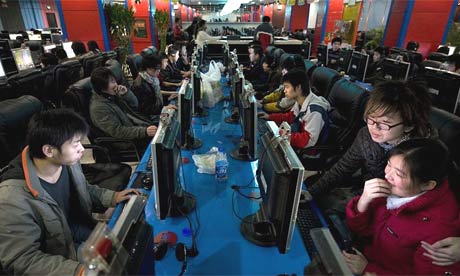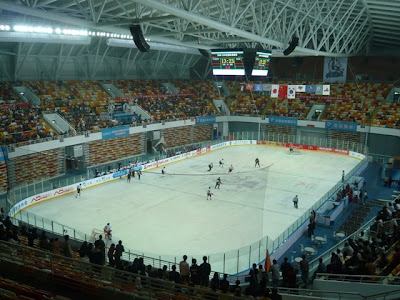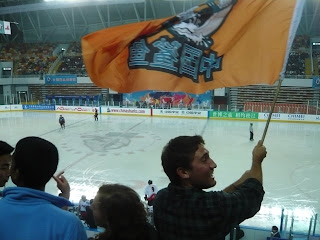Following up on my last post on the Sharks, I wanted to get a little more into the (extremely awkwardly-named) league they play in,
Asia League Ice Hockey. You can find pro hockey all over the world now, but this has gotta be one of the more unique situations. The league was formed as an expansion of the Japan Ice Hockey League in 2003, and four of the seven current teams are still Japanese (the Sharks are Chinese and the remaining two teams hail from South Korea). It's been a turbulent 5 years for the league though, as the Russian team from Alex Mogilny's hometown of
Khabarovsk* and three Beijing-based teams have already folded. The current edition of the China Sharks was just created this year as a merger between two of the defunct Beijing teams.
The Sharks, incidentally, are co-sponsored by the San Jose Sharks and the Chinese National Team. Nine of the Sharks also play for Team China, and goalie Wade Flaherty will be pulling double duty as a goalie coach during international competitions. The Sharks' GM is a San Jose employee who, as far as I can tell, lives primarily back in the US.
Most of the ALIH rules are adopted from the NHL (including 4-on-4 OTs and shootouts), though they did opt for no-touch icing and a 3-2-1-0 W-OTW-OTL-L point system. It seems to me that the rinks are a little bigger than the NHL standard, though I'm not completely sure on that. The regular season lasts 36 games, and is split up into three-game series played on weekends. Five of the seven teams make the playoffs, with the regular season champion gettting a bye all the way through to the best-of-seven finals.
In terms of team makeup, the Japanese clubs are capped at two import players each, but the Korean and Chinese squads are allowed to have four, presumably because they're weaker. And, as an added bonus for perenially sucking, the Sharks will be allowed to bring in up to seven foreigners during the 2009-2010 season. It seems to me that these import restrictions are a newer development though, since the now-defunct
Nordic Vikings were chock full of Scandinavians as recently as 2005-06 (their only season).
I'll have to watch a few more games before I can really get into the style of play and all that, but something I'm definitely going to keep an eye on is the cultural dynamics that come into play in an Asian-dominated hockey league. As Dave King, a longtme NHL coach, said when he took over the GM post for Team Japan,
"The Japanese have a system in their culture where they respect the older people [and] it's the same in sports. The older athlete is a sempei, a younger player is a kohai. The kohai player would never embarrass a sempei player in practice, like in a one-on-one drill. Also, in a game, there's a tendency to give the puck to the oldest guy on the line. Again, it's that he should shoot, because it's a respect thing. This doesn't really work."
And as former NHL goalie Jamie McLennan reported during his time in Japan,
When I allowed a soft goal, the home crowd started chanting my name and cheering me. This was foreign territory for me - not surrendering a crappy goal, those happen to everyone - but the reaction of the fans.
Anyways, if I was a former-NHLer winding down my career or even just an ECHLer, I'd love to come out and play here. The list of NHL alums isn't long, but there are definitely a few recognizable names. Hall of Famer Esa Tikkanen came and played/coached in Korea for a while, Shjon Podein played in Japan, Tyson Nash and Jamie McLennan spent half a season with the Nippon Paper Cranes, and Steve McKenna, former bodyguard for both Gretzky and Lemieux (and veteran of both the Italian, British and Australian leagues as well), is currently in his second year here. Other notables include Martin Kariya, Paul's little brother, and Chris Allen, veteran of two NHL games and reigning winner of the
PETA Sexiest Vegetarian Next Door Contest.
Going the other way, the AHIL's had its first alumnus make it to the NHL in 2006 when
Yutaka Fukufuji played in four games for the LA Kings. Fukufuji's also the first Japanese-born player to ever play in the NHL.
* Seems to be as good a time as any to mention that Khabarovsk is only 20km from China. So if Mogilny had been born 21km south , it's conceivable that he would never have even played hockey.























